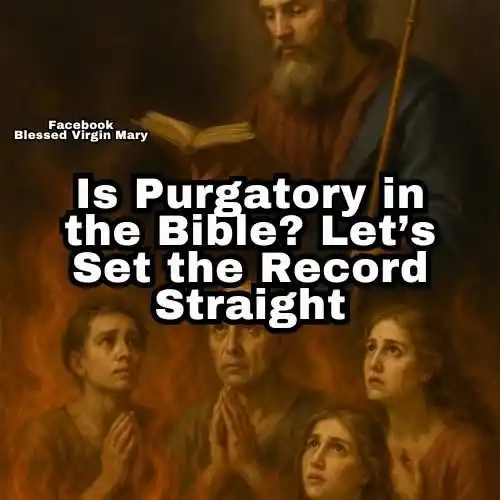
DIVINE RETREAT UPDATES AND PRAYERS
June 21, 2025 at 12:13 PM
Is Purgatory in the Bible? Let’s Set the Record Straight
Few doctrines are as misunderstood—and hotly debated—as Purgatory. For many, it conjures images of a fiery halfway point between heaven and hell. Critics often argue, “Purgatory isn’t in the Bible!” But is that true? What does Scripture actually say, and what does the Catholic Church really teach?
Let’s set the record straight.
First, what is Purgatory? According to Catholic teaching, Purgatory is a state of purification for souls who die in God's grace but are still in need of cleansing from the effects of sin before entering the full glory of heaven. It is not a “second chance” after death. It’s not a punishment equal to hell. Rather, it’s a merciful expression of God’s justice and love, ensuring that nothing unclean enters His presence (cf. Revelation 21:27).
So, is the word “Purgatory” in the Bible? No—just as the words “Trinity” and “Incarnation” aren’t found there either. But the truths they express are. The doctrine of Purgatory, while not explicitly spelled out in one verse, is solidly rooted in Scripture, tradition, and reason.
1. Scriptural Foundations
In 2 Maccabees 12:44–46, we read that Judas Maccabeus and his soldiers prayed for their fallen comrades and made offerings for the dead so that they might be loosed from their sins. The text says, “It is therefore a holy and wholesome thought to pray for the dead, that they may be loosed from sins.” This is a clear biblical example of praying for the dead, which would make no sense if the dead were either in heaven (where they don’t need prayers) or in hell (where prayers cannot help). This implies a middle state—a place of purification.
Protestants often reject this passage because 2 Maccabees is not in the Protestant Bible. However, it has been part of the Christian canon since the early Church and remains in Catholic and Orthodox Bibles.
In 1 Corinthians 3:13–15, St. Paul writes about a person’s works being tested by fire on the Day of Judgment: “If anyone’s work is burned up, he will suffer loss, though he himself will be saved, but only as through fire.” Paul speaks of a saved person—yet one undergoing a painful purification. Again, this aligns perfectly with the Catholic understanding of Purgatory.
Matthew 12:32 also offers a hint. Jesus says that certain sins “will not be forgiven in this age or in the age to come.” This implies that some sins can be forgiven after death—again, suggesting an intermediate state.
2. Early Church Belief
The early Christians prayed for the dead and believed in post-death purification. Church Fathers like St. Augustine and St. Gregory the Great spoke of Purgatory. If the early Church got this so wrong, it would have been corrected. Instead, it was taught, defended, and practiced.
3. God’s Justice and Mercy
Purgatory is not a threat—it’s a promise. It’s a sign that God doesn’t discard souls because they aren’t perfect at the moment of death. Instead, He purifies them. Like gold tested in fire, we are refined so we can see God face to face.
Purgatory is biblical in spirit, if not in name. It's part of God’s divine plan of love, sanctification, and justice.
Follow us for more Catholic teachings—and comment below: Have you ever prayed for a soul in Purgatory? What does this practice mean to you?
#catholic
@followers
Francis Mary

🙏
1